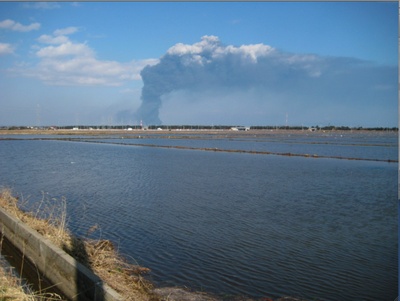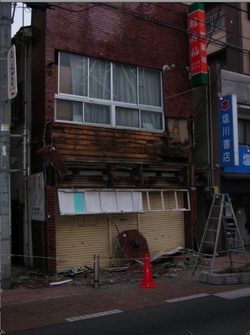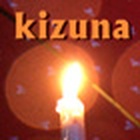Read Part 3 >>
This is a recreation of my personal experiences from the e-mails that I sent to friends in Canada and Japan, TV news reports in Canada, the U.S., and Japan, and from what my wife Akiko told me.
Continuation of Tomo’s email from March 15:
Back to Sendai
Life here: …shortage everything. But we have so much more than tens of thousands of others. We took turns standing in line at the local food store for two hours. Petrol for the car—none. Kerosene—I basically hounded a guy to sell me about 6 liters to fill our bottle—twice normal price. Then I returned to find that the stove tank was one third full instead of 10% as “Mrs. Dragon” reported. She was wrong and I told her so in a calm fashion. For days she has been yelling and screaming at me about this and that. As a couple, we are not like the people across the street. They are hand in hand and in their 50s with grown sons. The get on very well. This sort of stress does not make O-san and I a better couple.
The kerosene guy told me that was the very last drop I was going to get. This was after I saw him selling 48 LITRES to some puss-head down the street. Yes—some people are hoarding. Most people are just getting by from day to day. That was yesterday. Same kerosene guy. He refused to sell me any and said that the grinning sh** that was digging into his wallet had ordered it before the quake.
With the electricity back on, we can use an electric frying pan and the rice cooker. We have some electric heat. The weather will get warmer—slowly. Hopefully another big shake will not happen.
By the way—the aftershocks…some just now are HUGELY more exponential than the worst quakes of 1933 and 1994 in roughly the same area. This is a big chunk of Pacific territory 500 km long and 200 km wide. The whole plate buckled. The geophysicist on NHK said that such a huge movement would mean a lot of readjustment—hence aftershock. The ground feels like you are on the sea—like right now!
The government:
The Kan government is not looking very good.
[Editor’s note: Tomo is responding to Norm’s earlier email (see part 3)]
Well, IMHO it is looking better than I expected. Kan flew into a rage and then flew to the nuke to give them a bit of stick—then back to Tokyo to give a press conference. There have already been a couple of bills passed to get some action started. The central bank dumped about 7 trillion into the widening hole to stave off financial blow back, and government agencies have been as forthright as possible without contributing to panic.
Canada is not doing much. The government is not sending money or matching donations and only offering the assistance of the DART who are on standby.
Well, I don’t think that Canada understands or even likes Japan very much. America has always had a different relationship. Canada likes cuter and sexier victims that have more PC cache than Japan—like fly-covered, big-eyed black waifs. If the average Canadian could see the destruction and gauge the forbearance and courage of so many people here, they would be ashamed. And everyone else is here—including the Turkish Red Crescent. It is terrible to say, but Canada is no exception to disaster, so it should put out some effort if it wants help in the future. Japan has sent aid and workers to lots of places that have suffered in quakes—the latest being in Christchurch.
S-kun—the poor tad—is suffering from the usual pollen allergy, as is O-san. There is no doc open to give him his medicine, so tonight I carved up one of my remaining Contact C caps [Contac]. I think he is sleeping OK now. Tomorrow I’ll have to get in 2-3 hour lineup to see if I can get him more.
It is raining hard. Tomorrow they say snow. Two days ago it was 15 degrees and sunny.
Thanks for your concern. It is marvelous to have caring friends and family. It means so very, very much.
Very warm regards,
Tomo

This is out in the 400-years-old rice fields. Here the houses were intact. Many of them appeared dry inside as they are raised up a bit off the land. Mud all over the place and the smell of salt water in the soil. In the picture, you can see the flooded land. In the distance, there is a column of smoke coming from a huge fire in Sendai Port. Some morons thought it was a good idea to build the gas works right in a tsunami threatened area. (Photo & caption courtesy of Lorne Spry)
***
Hey Tomo, There is so much going on for you guys…
Regarding Senji and family: unless you have got a stadium size space, I don’t think that it would help your family situation to have his family there too. I am assuming that his mother is with him, so there would in fact be 4 more people to take care of…he’s the kind of guy who would be fine in an evacuation center and there would be medical help there for his mom if she needs it. I heard that Atsuko was off on the day of the tsunami, so she didn’t experience the full brunt of the killer wave…to be honest, I thought there was a good chance that you were on your bike in the affected area so was very worried that you might have been a victim.

Most buildings in Sendai survived OK, but not all. This is one of those 100 year old buildings in Kawara-machi near where I live in Shirahagi-machi. I went to check on a friend who is the proprietor of a hair salon opposite. Some other buildings were damaged there too. (Photo & caption courtesy of Lorne Spry)
Your pictures tell the story. I worry most about the people who lost loved ones. Akiko’s head is swimming because she has been following the news constantly and has talked with her mom and sisters who, thank god, are all fine. Her sister is riding her bike to work at an old age home and I don’t know if her brother-in-law (a civil servant) is going into the office. The pictures they show on the media here is a revolving reel of the worst scenes of villages being swept away and a bombed-out looking area, fields of scattered board and roof tops…there are a lot of idiots who are reporting from Tokyo and other distant places as if they had any inkling of the horror that you guys are all living with now. I think that it is really important to get some more accurate reporting to the west so that we can better understand what you are all going through.
Take lots of pictures, Tomo. I’ll forward what I can to newspapers in this area. Write your observations too and this will help more people understand.
Akiko told me today that people in Tokyo and even Osaka are hoarding food now and complaining about the rolling blackouts that they are experiencing. She’s in a fury about the selfishness of those people in the face of such horrendous hardship that you all are dealing with. The coastal areas…damn, my heart truly goes out to them all…wish there was something I could do…
How is O-san’s family in Fukushima doing? I hope that they are all well.
I can’t really understand what you guys are going through, Tomo, but I don’t want you guys to be consumed by the stress and worry that has engulfed your lives. I truly hope that you can survive this hardship without too much domestic warfare on top of everything else…I really think that you are the wiser one in the family, my friend, so I hope that you can help everybody pull through intact.
Stay in touch, Norm
© 2011 Norm Ibuki






